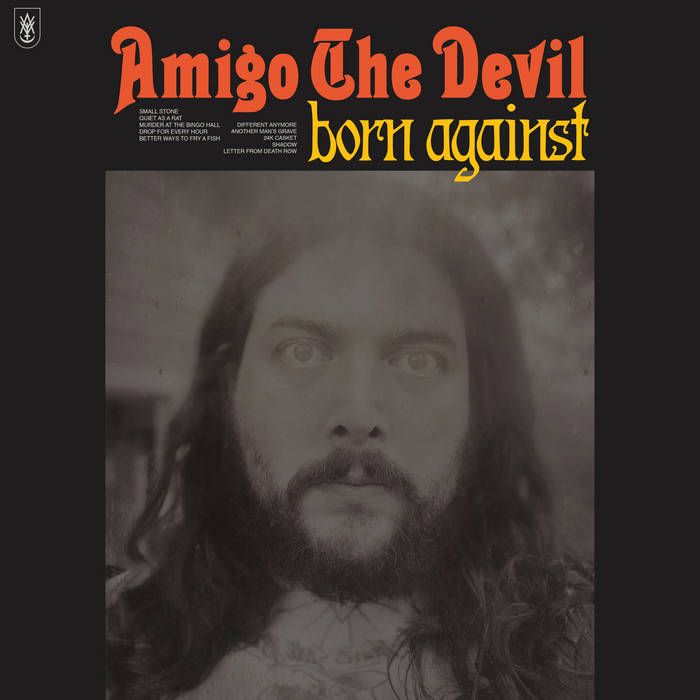Amigo the Devil’s new album shows that he was ‘Born Against’ Christian morality
by Madi Vespa
2021-04-26

Amigo the Devil
Born Against
Liars Club · April 16, 2021

CONTENT WARNING: Due to the graphic nature of this album, this review will mention violence and death. It is also important to note that the album itself explores these themes, as well as suicide, sexual assault, and drug use. Listener discretion is advised.
Amigo the Devil, also known as Danny Kiranos, explores the intersection between morality and Christianity in his new album, Born Against. The folk album serves as an indictment of Christianity, with graphically violent lyrics accompanied by the sarcastic interpolation of religious rhetoric, as heard most notably in “Better Ways to Fry a Fish.” In the wake of the controversy surrounding the music video for Lil Nas X’s “MONTERO (Call Me By Your Name),” it is worth noting that this album has even harsher critiques of the religion in question. While the album is completely different from Lil Nas X’s track both sonically and lyrically, it is still an exploration of trauma caused in the name of “salvation.” Those who clutched their pearls at Lil Nas X’s music video may want to steer clear of Born Against.
The almost chaotic opening to Born Against resolves quickly in “Small Stone.” Kiranos embraces a compressed sound in the beginning of the track, almost as if one is listening to the song on an old record player. The first part is simple, with only vocals, piano, guitar, and banjo. The song then transitions into an orchestral interlude, and Kiranos’ vocals, which were previously subdued and compressed, return with a large, theatrical, and almost operatic sound, similar to that of Orville Peck. The song builds consistently, and after the lyric where Kiranos says he will “show you the pain of getting clean,” there is a moment of silence before a full band outro begins, backup vocals and all. One of Kiranos’ strengths on this album is the support his instrumentation provides to the lyrical content of each song, and he sets that precedent early on. “Small Stone” serves as a strong introduction to the rest of the album’s sound.
Through his instrumentation as well as his lyricism and vocal inflection, Kiranos is an effective storyteller. This is true for not only this album, but for the entire Amigo the Devil discography. Every aspect of a song somehow contributes to the story. This is especially apparent in “Murder at the Bingo Hall,” where, after the lyric “the room got quiet,” the music almost entirely drops out, with the exception of a quiet synth, and Kiranos’ now compressed vocals take a back seat to the sound of heavy breathing as he describes the atmosphere of the bingo hall. The usage of breath as a storytelling device is not exclusive to “Murder at the Bingo Hall,” as it appears again in “Drop for Every Hour,” a violent Johnny Cash-esque recollection of seeking vengeance against a man who has wronged the speaker’s family. In “Drop for Every Hour,” another one of Kiranos’ strengths shines through: his ability to blend the spoken, or recitative, the sung, and the yelled.
This vocal blending, as well as the theatrical elements presented in “Small Stone,” are especially present in “Different Anymore,” a song that sounds as if it were ripped right out of a contemporary rock opera. This track exemplifies Kiranos’ compositional strength, and is one of two songs that features the title of the album in the lyrics, the other being “Quiet as a Rat.” The most notable part of “Different Anymore” is the stunning high notes from Kiranos’ ensemble of backup vocalists. From “Different Anymore” through to the final track, “Letter from Death Row,” is the strongest sequence of the album. The theatricality in “Different Anymore” is also present in “Another Man’s Grave,” where Kiranos weaves together graphic, literal, and metaphorical lyrics seamlessly. The aforementioned blending of different vocal inflections is especially pronounced in this track, and is done very well.
Throughout the album up to this point, there has been a lot of analog instruments, and not much representation of electronic instruments, but this changes in the penultimate track, “Shadow.” There are some sharp hits from what seems to be an electronic drum track in certain places, and a scraping noise reminiscent of that in Billie Eilish’s “you should see me in a crown.” This incorporation of electronic elements adds to the spooky atmosphere of the song, and the scraping sound creates a sense of discomfort, which makes sense, as the song’s central question asks, “who protects the shadow from the dark?” This song also provides scathing criticism of Christianity, with lyrics such as, “A thousand different angles say the circles name in vain / Are we crucifying the savior or a masochist in pain” and “The old interpretations of how everyone should look / The cold and spiteful rhetoric inspired by a book / And hate without tradition is Noah without the ark.”
Born Against closes with a solemn ballad of a man preparing for death, with “Letter from Death Row,” a beautiful love song laced with traces of violence and something that is close to remorse, but not quite. The lyrics, which are shockingly self-aware and self-deprecating, simultaneously lift up the subject of the song with lyrics like “you’re the closest thing to heaven I’ll ever see.” The anti-religious themes from the rest of the album are continued in this song, and “Letter from Death Row” serves as a gorgeous, subdued finale to an album filled with righteous violence.
Danny Kiranos, or Amigo the Devil, effectively unifies theatricality, strong composition, anti-Christian sentiments, and violence in his new album Born Against. Kiranos plays to long-standing folk and country tropes, and also brings folk into 2021 with some electronic elements. Born Against is a striking and poignant part of the ever-present conversation surrounding the negative aspects of Christianity.
